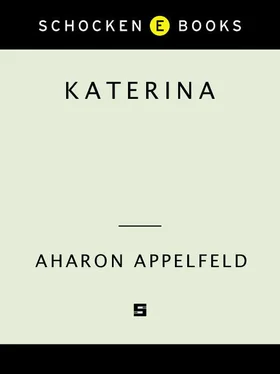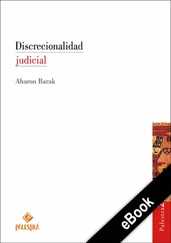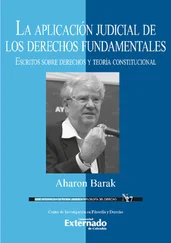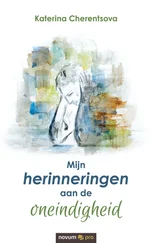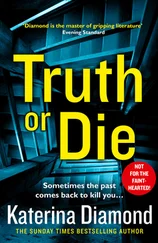That winter was very long. Occasionally, strong feelings would assail me, acute beliefs that would make my head spin till I felt faint. There were moments when I was very close to my dear ones, a great and very private closeness, especially to Benjamin, my little angel. That winter I told one of the women prisoners, “I don’t need Jesus. I have my own Jesus.” I didn’t know what I was talking about, but they allowed me opinions and beliefs. People are cautious with murderers.
But most days I was depressed and kept to myself. My vision was diminished, my ears grew deaf, and I was sealed up like a wall. When they put out the lights, I curled up in my coat like an abandoned animal. The morning didn’t inspire me with will or faith; I would dress and report for roll call as if it were an extension of a restless sleep. For a long time we would wait for the truck, and when it came at last, the women prisoners hurried to clamber aboard, knocking each other over in their rush. The truck was closed with a tarpaulin, and it was warmer there.
“Start working. That’ll warm you up,” said the old guard. He didn’t beat us, but he berated us, saying that man was born to toil, there was no sin without punishment, and that one must accept punishment with love. The guards weren’t evil spirits but human beings who did their duty. This world was only a corridor to the anteroom. Without doubt, there was a religious tinge to his words. Sometimes that tone evoked a thread of awe as in the priest’s funeral prayers.
For six hours we would extract beets from the frozen earth. The spades were dull, but nevertheless our limbs did the impossible, bringing the beets up from their icy beds. After a few hours, there would be a pile of white beets. In the afternoon they brought us soup and a crust of bread. The food was tasteless, but a person can get used to anything. Sometimes a woman would despair of her life and flee, but not for long. The gendarmes would find her.
“Why not accept torments with love?” the old guard would preach his sermon to us all.
“These aren’t torments, that’s just humiliating,” one of the women prisoners answered him blandly.
Nothing mattered to me. In those dark and opaque days, I did what I had to do. I didn’t complain and I didn’t make accusations. But occasionally, in the winter—and this happened several times—a kind of malicious joy would spread and grate upon my nerves. The pain was great, but I restrained myself. In the end I couldn’t bear it anymore. I raised my voice and shouted, “Silence!”
“What do you want?” a prisoner asked impudently.
“Not to talk.”
“ Me?”
“You.”
People treat murderers with respect. Not even the women guards yelled at me, but in my heart I knew my strength wasn’t my own. Only when I was close to my dear ones did I have a voice, and there was awe in me.
At the end of the winter a lot of stolen shirts and sweaters reached us. Everyone was happy, but they didn’t show it. “Don’t put on that shirt. Katerina is roaming about.” I would hear the whisper, my small revenge in this darkness.

23
IN APRIL THE DAYS WERE BRIGHT, the mornings very cold, but in the afternoons the sun would come down and warm us. We worked in open fields and we would return drunk with the pure air. Had it not been for a few escapes, the days would have passed uneventfully. After every escape came the beatings and the screaming. The chief guard, a sturdy, cruel woman, was responsible for the beatings; she beat with lust and devotion. She didn’t torment murderesses, but she wheedled them, “Why face trials? Solitary confinement is no Garden of Eden, believe me.”
Time vanished in the daily schedule. Your previous life grew ever more distant and vague, as though it wasn’t your own. A prisoner came back to the shed after a day’s work and sought nothing but her bunk. One woman remembered that she once had been held back a class in school, and her father, a senior official in the local council, wept from sheer embarrassment.
“My father,” she confessed to me, “was apparently a little Jewish. At any rate, there was something Jewish about him. Only Jews are capable of crying about something like that.”
“He didn’t beat you?”
“No, he just wept.”
“Do you have good memories of your father?”
“No. His weeping frightened me. He was a stranger to us all.”
“What makes you suspect him?”
“I don’t know. As a young man, he worked for Jews, and so did his mother, my grandmother—for many years she worked for Jews. Jewish manners clung to them.”
“But you loved him.”
“I didn’t know how to love him. He liked to sit in the garden for hours and gaze around. I was afraid of him. In truth, we were all afraid of him. The Jews had a bad influence on him.”
“Is he still living?”
“He died a year ago. I asked to attend the funeral, but they didn’t let me. It’s better they didn’t. Everyone would have looked at me with pity. I don’t like to be pitied. A person should suffer in silence.”
Thus, from the thick depths, little trills rose up. Those whispers were absorbed very well in the shed, but they had the power to move one for a moment.
“How much more time do you have left?”
“I don’t count. Anyway, I won’t live to be freed.”
I kept my secrets, and I didn’t reveal them. Only with my lawyer would I exchange a few sentences and be moved. Once a month, he came to visit and brought me fruits that were in season. He was fifty, but his tattered clothing made him look older. If I could have done it, I would have laundered his shirt, pressed his suit, and polished his shoes. His loyalty pained me.
“How are the Jews in the villages?” I asked, not in my own voice.
“Why are you asking?”
“Because I’m afraid.”
“A person should worry about himself. You have enough problems of your own.”
Everything that happened in the villages was well known here—a robbery or murder every month. Jewish clothes came in regularly, even a pair of candlesticks. If I had money, I would have bought the clothes from the women and put them on my bunk. At night I would breathe in the starch hidden in their fabrics. I missed the village Jews—their little stores that gave off an odor of sunflower oil, the children racing about in the courtyard, the silence of Sabbaths and holidays, the old Jews standing at street corners and looking about in wonderment. For a long while they would stand, and suddenly a smile would rise to their lips, then they picked up their feet and disappeared. For hours I would observe their birdlike way of walking. I always had the feeling that they were linked to blue and silent worlds.
But, even to myself, I didn’t reveal the great secret. My Benjamin had gone up to heaven and he was the true Jesus. Jesus in the churches has rosy cheeks, plump arms, and his whole look is annoyingly self-righteous. A kind of revolting spirituality. A fake angel. But my Jesus had been in my womb, and to this day he fills me. My Benjamin doesn’t look self-righteous like the icons in the church. My Benjamin used to bite. They were sharp but sweet bites, sealed into my flesh to this day. My Benjamin would stick out his tongue and tease me, and sometimes he hid under the table and called in a chirping voice, “Mommy’s a mouse. Mommy has a tail.” Benjamin was mischievous. Without his mischief, I wouldn’t have known how much light there was in him. Sometimes I said to myself, Where is my mischievous one? There were days when I saw him in the midst of a field or among the open containers, the ladles, and the coarse words. He was present everywhere. I don’t like it when people bow and scrape. After kneeling and bowing down, a person is capable of dreadful actions. On Sunday, after prayers, they used to behead animals for the big meals.
Читать дальше
